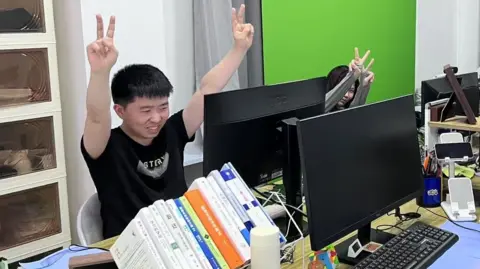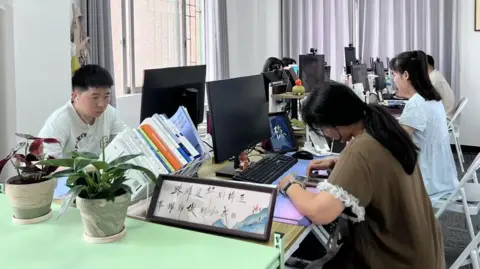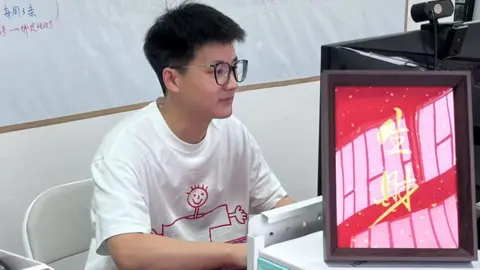BBC China, Hong Kong
 BBC
BBCNobody wants to work without getting a salary, or worse-forced to pay to be there.
However, pushing companies so that they can pretend to work for them becomes common among unemployed youth in China. It has led to an increasing number of service providers.
This development comes among the slow China market and jobs. Chinese unemployment for youth is still stubbornly high, In more than 14 %.
With real jobs that are increasingly difficult to reach, some young people prefer to pay to go to the office instead of being stuck at home.
Shui Chu, 30 years old, had a commercial food project that failed in 2024. In April this year, he started paying 30 yuan ($ 4.20; 3.10 pounds) a day to go to a models office run by a company called Printend to the Labor Company, in the city of Dongguan, 114 km (71 miles) north of Hong Kong.
There he joins five “colleagues” who do the same.
“I feel very happy,” says Zhu. “It seems as if we were working together as a group.”
These operations now appear in the main cities throughout China, including Schinshen, Shanghai, Nanjing Woyan, Chigand and Koning. Often it looks as full functional offices, and they are equipped with computers, internet access, meeting rooms, and tea rooms.
Instead of those present sitting around them, they can use computers to search for jobs, or try to launch their own business. Sometimes, the daily fees, which range between 30 and 50 yuan, include lunch, snacks and drinks.

Dr. Christian Yao, a great lecturer at the Faculty of Administration at the University of Victoria, Wellington, New Zealand, is an expert in Chinese economy.
“The phenomenon of pretending to work is very common now,” he says. “Because of the economic transformation and incompatibility between education and the labor market, young people need these places to think about their next steps, or to take strange jobs as a transitional stage.
“Office companies are one of the transitional solutions.”
Mr. Zhu coincided with the demonstration company for the work company while browsing the social networking site Xiaohongshu. He says he felt that the office environment would improve self -discipline. There was now for more than three months.
Mr. Chu sent pictures of the office to his parents, and says he is more comfortable than his lack of work.
While those present can reach and leave whenever they want, Mr. Zhu usually reaches the office between 8 am and 9 am. Sometimes he does not leave until 11 pm, just leaving after the company’s manager leaves.
He adds that others are now like friends. He says that when someone is busy, like hunting jobs, they are working hard, but when they have free time, they are chatting, removing and playing games. They often have dinner together after work.
Mr. Zhu says he loves to build this team, and that he is happier than before joining him.
In Shanghai, Xiaowen Tang rented a working station for a work company demonstrating in Shanghai for a month a month this year. The 23 -year -old graduated from the university last year and has not yet found a full -time job.
Her university has an unwritten base that students must sign an employment contract or provide evidence of training within one year of graduation; Otherwise, they will not get a diploma.
She sent the office scene to the school as evidence of its training. In fact, the daily fees were paid, and in the office I sat online writing online to earn some pocket money.
“If you are to fool it, just forged for the end,” says Ms. Tang.
Dr. Piao Xiang, director of the Max Planck Institute for Social Anthropology in Germany, says that demonstrating in China towards work comes from “feeling frustrated and impotence” regarding the absence of job opportunities.
“Prevention of work is a shell that young people find for themselves, create a simple distance from the prevailing society and give themselves a small space.”
The owner of the demonstration company for the work company in the city of Dongan is the 30 -year -old Feiyu (a pseudonym). He says: “What I sell is not a workplace, but the dignity is not to be a useless person,” he says.
He himself was unemployed in the past, after the previous retailer had to own him had to be closed during the Covid. He recalls, “I was very depressed and a bit of merge.” “I wanted to turn the tide, but you were helpless.”
In April this year, the announcement of the demonstration began to work, and within a month all the work stations were full. You must provide new successes for progress.
Feiyu says 40 % of customers are new university graduates who come to take pictures to prove their training experience in former teachers. While a small number of them come to help deal with pressure from their parents.
The 60 % of the other are independent, many of them are digital Bedouins, including those working in large e -commerce companies, and electronic space book. Average age is about 30, with the smallest of them 25.

Officially, these workers are referred to as “flexible employment specialists”, a group that also includes horseback drivers and truck drivers.
In the long run, Feiyu says it is doubtful whether the work will remain profitable. Instead, he loves to be seen as a social experience.
“He uses lies to maintain respect, but it allows some people to find the truth,” he says. “If only users help us to prolong their acting skills, we collude with a gentle deception.
“Only by helping them convert their fake work into a real starting point, this social experience can really rise to the level of its promise.”
Mr. Zhou is now spending most of his time improving his skills in artificial intelligence. He says he noticed that some companies define efficiency in artificial intelligence tools when employment. So he believes that acquiring artificial intelligence skills “will make it easier” for him to find a full -time job.
https://ichef.bbci.co.uk/news/1024/branded_news/9aeb/live/b97674d0-744c-11f0-a975-cb151ca452f4.jpg
2025-08-11 01:50:00














